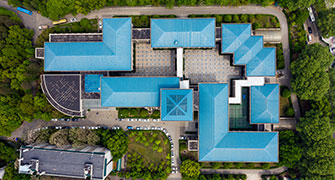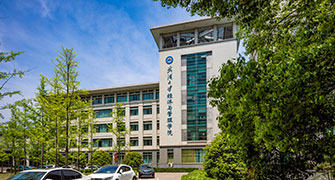Given the ongoing impact of the global epidemic, how can we cope with the unprecedented changes in the world economy? On the road to rise, how should China show its responsibility as a great power in the turbulent times? On the evening of April 30, The Economics and Management School of Wuhan University held an open course on "Fighting the Epidemic" on the Internet platform. Vice Dean Professor Yu Zhen was invited to deliver a keynote report on "Great Changes in the World Economy and responsibility of China ". More than 13,000 audience members participated in the lecture and interacted with Professor Yu online.
There are three main historical periods for the world economy. The first is the Malthusian trap, in which economic growth hovered at a low level. The second is the period of industrial revolution. The transformation took place not only in industry, but also in agriculture, resulting in great economic growth. The third is the great Divergence. Smith'sWealth of Nations pointed out that the source of national wealth comes from division of labor, which is specialization. Trade promotes wealth growth. Each country has its own comparative advantage and can benefit from trade. However, the state is not an abstract state. There are many subjects within the state. Just because a country benefits as a whole does not mean that all parties within a country will benefit. The distribution of interests within a country makes the international trade issue full of controversy. Therefore, some people will oppose globalization and some people will support it. As for the world economy, which is full of controversy, we need to pay attention to its changes and impacts.
01 Changes in the World Economy: a three-volume analysis Framework
We use inventory, increment and variable to construct an analytical framework for the evolution of the world economic pattern. The inventory is economic globalization, the increment is technological progress, and today a huge variable is COVID-19. From the perspective of inventory, the changes in the world economic pattern are sticky. Globalization is like a chain that locks countries together and makes them all prosper and suffer. Abrupt shifts in the balance of power are unlikely. In terms of increment, scientific and technological progress has brought about the overall growth of the world economy. However, innovation is also unevenly distributed across countries. Those who grasp the future technology will be more proactive towards the future. In terms of variables, the COVID-19 outbreak has had a huge impact on the world economy.
At present, the world economy is beset by inventory problems, incremental changes and variable chaos.
Inventory problems: Anti-globalization. Some countries are facing serious distribution problems. Anti-globalization is returning. Populism and trade protectionism are on the rise.
Incremental changes: The technology has changed. The progress of technology finally contributes to the formation of global production network and the construction of international division of labor system, which is the basic driving force of the evolution of world economic pattern. With the popularization and commercialization of related technologies, the importance of technology to production will reach an unprecedented high.
Variable chaos: COVID-19. On The morning of April 14, the IMF released its latest “World Economic Outlook report”, saying that world economic growth was suffering the worst hit since the Great Depression of the 1930s, and global GDP growth was expected to shrink by 3% in 2020. For the first time, the world was facing recession in both advanced and emerging economies.
The world economic landscape has become multi-polar and uncertain. Economic aggregates have risen in the south and fallen in the north, currencies of emerging countries have risen. Developing countries have made remarkable achievements in industrialization. Uncertainties have increased significantly under COVID-19.
There will be new trends in the post-epidemic era, including the rise of nationalism. The security strategy will become a major national strategy. The capacity for "state intervention" became the basis for great power competition. Diversification will be the main trend. Globalization is still the mainstream, but anti-globalization is becoming more and more important. In the short term, countries will increasingly reject and discriminate against China. Information technology and artificial intelligence will further transform the world.
02 China-us relations: Whether we remain true to our original aspiration under changing circumstances
Let's look at China-US economic and trade relations under the great changes of the past century. We must remember where we began. What is the original purpose of China-Us relations? In 1784, the US government sent the Empress of China across the ocean to China, opening the prelude to trade, cultural and military exchanges between the two countries. In the subsequent history, including the beginning of Sino-American diplomacy, the Treaty of Wangxia, the return of Gambia to Tsinghua University, Rockefeller Foundation and Modern Chinese medicine, these historical events show that the original intention of Sino-American relations is to carry out trade, as well as cultural, medical and educational exchanges. These “original thoughts" are still the points.
Since 1949, china-us relations have gone through a cycle of five phases. The period from 1949 to 1975 was a period of isolation, during which there was no normal contact between China and the US. From 1976 to 1978, China and the United States made peace due to geopolitics. During the honeymoon period from 1979 to 1989, China and the United States carried out all-round cooperation. From 1990 to 2016, China and the United States began to compete in cooperation. Since 2017, China and the United States have embarked on a comprehensive competition phase. China-US relations have evolved from isolation to contact, contact to cooperation, and cooperation to contradiction.
Relations between China and the United States are at risk: The implementation of the first phase of the trade agreement shows the issues of strategic mutual trust, the decoupling theory of industrial chain majors, the politicization of the epidemic and the Taiwan issue. A trade war is a kind of mutual harm. President Trump said at the 74th Session of the United Nations General Assembly, "The future does not belong to globalists. The future belongs to the patriots. The future belongs to sovereign and independent states that protect their citizens, respect their neighbors and respect the differences that make each country unique". Thus, in the era of globalization, the national identity is not disappearing, but becoming more and more prominent.
The unprecedented trade war has brought the two countries into sharp conflict on economic and trade issues. The United States has used almost all trade measures. With the escalation of trade conflicts, the positions of all sectors of the United States are more unified than before, and they are mixed with multiple frictions and conflicts, including competition of strategic power, conflict of commercial interests, institutional competition and ideological conflict.
There are some concerns in the relationship between China and the United States. The catalytic effect on the value chain and the mixed effect of globalization make the trade ballast function limited. The risk aversion and discrimination effect make the epidemic have a long-term impact on trade. Heterogeneous demand and competitive supply have also intensified the dispute between China and the US over the dominance of global economic and trade rules. There is a risk of a sharp deterioration in China-Us relations in the post-epidemic era.
03 The responsibility of China: A stabilizer for the world economy
The reshaping of trade rules: As a staunch defender of multilateralism and free trade, China should uphold the framework of multilateral rules, adhere to the principle of consensus and respect the development models of its members. As an active provider of global trade public goods, China should promote the formation of a theoretical system for reshaping global economic and trade rules, and contribute its solutions to issues such as e-commerce, investment facilitation, small, medium and micro businesses, and digital sovereignty. China should also attach importance to regional economic cooperation. Relying on the Belt and Road Initiative and its neighbors, China should speed up the building of RCEP and China-Japan-ROK free Trade area, and consider joining CPTPP.
Coping with the superpower games: China should realize that the trade war between China and the United States is not accidental or short-term, but long-term. In the future, friction between China and the United States will spread to more areas. This is an objective fact. Adequate preparations should be made. China and the United States should strengthen communication on strategic issues, avoid misunderstanding and miscalculation, enhance mutual understanding, focus on cooperation and manage differences, so as to promote the healthy and stable development of China-US economic and trade cooperation and bilateral relations.
Try to be yourself: Under the premise of regular epidemic prevention and control, Hubei province should speed up the restoration of normal order of production and life, do a solid job in the "six stability" work, and implement the "six guarantee" task. We will focus on ensuring people's employment and their basic livelihood, help them solve their actual difficulties in employment, social security, medical insurance, and schooling, and implement policies to ensure that people with special difficulties can find a living wage. We will resolutely win the battle against poverty and ensure that all poor people are lifted out of poverty. We should speed up the resumption of work and markets; help solve the difficulties faced by enterprises, especially small, medium-sized and micro businesses. We promote the recovery and development of pillar industries such as automobile manufacturing, electronic information, new materials, and biomedicines, so as to stabilize the Economic fundamentals. We will launch a number of major projects to accelerate the development of traditional infrastructure and new forms of infrastructure such as 5G and artificial intelligence. We will focus on rice and other agricultural production, expand sales channels for agricultural products, and increase farmers' incomes. We will strengthen the building of public health and other emergency response systems and improve our ability to respond to and deal with major emergencies.(Rewritten by Lai Xiaowei,Edited by Luo Yu Zhang Yixin)
 Faculty and Staff
Faculty and Staff Academics
Academics Programs
Programs International Exchange
International Exchange






